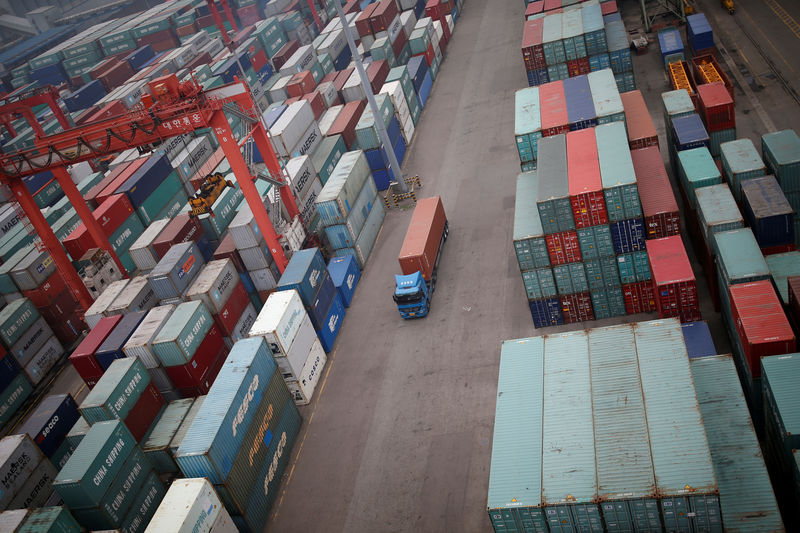 © Reuters. FILE PHOTO : A truck drives between shipping containers at a container terminal at Incheon port in Incheon
© Reuters. FILE PHOTO : A truck drives between shipping containers at a container terminal at Incheon port in IncheonBy Hayoung Choi and Cynthia Kim
SEOUL (Reuters) – South Korean exports likely fell the most in nearly three years in February as China demand falters, a Reuters poll showed on Tuesday, pointing to further stresses caused by the Sino-U.S. trade conflict.
Exports are expected to have contracted 10.8 percent from the same period a year earlier, the third consecutive month of declines and a much sharper drop than January, according to a median estimate of 12 economists. Exports fell 5.8 percent in January.
Imports were predicted to shrink for a second straight month, falling 11.6 percent in February compared with a dip of 1.3 percent in January.
Analysts said exports from Asia’s fourth-largest economy would remain subdued possibly until the third quarter on cooling demand in China, its biggest trading partner.
“Korean export growth will bottom out in the third quarter, as Chinese growth starts rebounding in the second quarter,” said Lee Seung-hoon, an analyst at Meritz Securities. “For the full year, we see exports shrinking by 4 percent.”
Though trade negotiations between Washington and Beijing appear to be making some progress, export-driven Asian countries including South Korea, Japan and Taiwan are reeling from disruptions in supply chains.
“Given the easing trade frictions and emerging impact of Chinese stimulus measures, trade performance will rebound gradually,” said Park Sang-hyun, an economist from HI Investment.
South Korea, the world’s sixth-largest exporter and biggest manufacturer of memory chips, also has been squeezed by the falling price of micro-chips and petroleum products, its other key export.
For the first 20 days in February, South Korea’s overseas sales fell 11.7 percent, with sales of memory chips and petroleum goods falling by 27.1 percent and 24.5 percent, respectively. By destination, exports to China tumbled 13.6 percent.
Survey respondents also forecast the February headline inflation rate would ease to 0.5 percent on-year versus 0.8 percent in January, remaining firmly below the central bank’s 2-percent target.
Despite falling exports, January industrial output is expected to have narrowly avoided contraction by gaining a mere 0.2 percent from a month earlier, versus the 1.4 percent decline in December.
January industrial output data will be out at 2300 GMT on Wednesday. Trade data are scheduled to be published at 0000 GMT on Friday, while the inflation figures will be released at 2300 GMT on March 4.
Fusion Media or anyone involved with Fusion Media will not accept any liability for loss or damage as a result of reliance on the information including data, quotes, charts and buy/sell signals contained within this website. Please be fully informed regarding the risks and costs associated with trading the financial markets, it is one of the riskiest investment forms possible.
Source: Investing.com





























